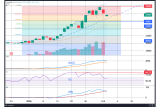
Case 1: Economy vs Share Prices
The prevailing sentiment suggests dwindling confidence in this notion – but for those in search of proof that the state of the economy and the stock market are entirely disconnected – Japan stands out as a perfect illustration.
Despite Japan’s economy unexpectedly slipping into recession for a second consecutive quarter at the end of 2023, the Nikkei stock index has been on a remarkable ascent. Since reaching its lowest point a decade ago, the Nikkei has nearly quadrupled in value and recently, has even surpassed its all-time bubble highs from the late 1980s. This divergence between the stock market’s performance and the state of the economy underscores the complex dynamics at play.
While recessions may not have a significant impact on the stock market, they are crucial considerations for central banks. The Bank of Japan for instance, is facing a challenging decision regarding its monetary policy, as hiking interest rates could deepen the economic contraction, while maintaining the status quo may risk hyperinflation. This juxtaposition between the robust stock market and the struggling economy presents a notable conundrum for policymakers and investors alike.
Case 2: JPY vs Company Valuations
The traditional belief that a weaker yen benefits exporters and enhances company valuations has come under scrutiny in recent times. In reality, the exchange rate of the yen has become less influential on Japanese share values.
This decoupling of the yen from share prices is not unexpected given the evolution of Japanese exporters. Established export-oriented companies have shifted away from traditional models of exporting goods manufactured in Japan, diversifying their businesses on a global scale. This shift can be exemplified by major shipbuilders in Japan, which have expanded their operations by establishing building facilities in other countries like China and the Philippines.
While some argue that a depreciated yen benefits exporters, its impact is now constrained due to the hollowing-out of the domestic manufacturing base.
However, it’s important to note that a cheaper yen still results in currency translation gains for Japanese companies with significant overseas sales. For example, automakers continue to demonstrate a strong correlation with the yen due to their extensive vehicle exports. Although this correlation weakened in 2022 amid chip shortages disrupting production, it reemerged last year.
The perception that Japan’s economy is export-driven also requires a reality check. Japan’s exports have stagnated over the past decade, partly due to production shifts abroad and loss of competitiveness. Notably, Japan is the only major economy where exports declined over the last decade.
Given these factors, it’s understandable that there’s no rush to invest in Japanese companies or stocks solely because the yen is depreciated.
Case 3: Dry Physical Market vs Order Backlog
Last but not least, we challenged the very assumption that the bulk carrier orderbook is intrinsically linked to the current condition of the short term physical market. While this positive correlation has generally held true over various market cycles, we have been witnessing an unprecedented surge in newbuilding bulk carrier orders in Japan extending into 2027/2028, despite a relatively subdued dry physical market.
The last time such extensive order backlogs were seen was during the super cycle preceding the Global Financial Crisis. However, that period was marked by a market fuelled by exaggerated (Chinese) growth. So, what sets apart the current situation from that era? One might speculate whether factors like inflation, rising labour costs, or declining population are influencing the current dynamics. There could be myriad of reasons. Nevertheless, what is apparent is the significant divergence between the short term physical and forward newbuilding markets, as market participants persist in placing orders at what is considered to be historically high levels, betting on a brighter future.
As many may argue, there is a need for a shift, advocating for shipbuilders to reduce newbuilding prices in order to align with the current condition of the physical market and longer term period rates. However, this prompts the question: why should they? It is clear that shipbuilders lack the incentive to reduce their prices in a high-cost environment particularly when they must fulfil a historically large order backlog. In fact, we contend that if anything, the physical market should adapt to mirror the genuine forward asset prices presently being observed.
In recent weeks, there have been indications of this adjustment beginning to unfold. Whether the physical market will ultimately synchronize with these changes remains uncertain. Suffice to say, it could be a favourable time to own ships, at least for the time being…
By Eugene Quek, Partner & Head of Japan.
Articles
You may also be
interested in
View allGet in touch
Contact us today to find out how our expert team can support your business
















